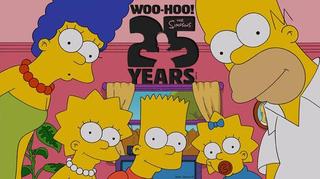 Today is a Simpsons anniversary. On December 17th, 1989, the first full length episode, a Christmas special, appeared.
Today is a Simpsons anniversary. On December 17th, 1989, the first full length episode, a Christmas special, appeared.
Of course, the characters premiered in 1987 on The Tracey Ullman Show. What most people don’t know, however, is that “Simpsons Roasting on an Open Fire” was not meant to be the first episode. The season was supposed to start at the beginning of Fall, with “Some Enchanted Evening.” However, the creators/producers were unhappy with the animation that came back from the finishers–it apparently looked too much like The Flintstones–walls shaking when doors were closed, etc. David Silverman helped clean things up and quality was favored over starting on time, thankfully.
A quick memory:
As a rabid Simpsons fan before the show even started, I was very much looking forward to the Christmas special. We set the family VCR. Mom watched the show with me and found the message of family love inspiring. I found that the show solidified my love for my yellow dysfunctional family.
My mom took the tape over to our extended family during the Christmas holiday. My grandmother denounced the show since Bart talked back and never watched it again. My mother turned to one of her sisters at the end of the episode, saying something along the lines of, “See, this just goes to show that you can have a great Christmas without having any money.”
It was patronizing and insulting, and I was mortified, but it wasn’t The Simpsons’s fault.
On The Simpsons, the Marathon, and the Modern TV Audience
August 20, 2014Tomorrow marks the start of something historic–a full Simpsons marathon on FXX. (It will take 12 days to do every episode.)
Afterwards, FXX will be putting The Simpsons into regular rotation. (I’ve always managed to live somewhere with a local affiliate showing it at least once a day–every other country I’ve visited (UK, Spain, Canada, Finland) has also had regular daily showings.
FXX is also hosting an APP–Simpsons World–that will give unparalleled access to the show (every episode, episode guides, etc). I mean, I have this access (as I’ve recorded every episode of the show and I have all the guides), but this APP will make things easier (no flipping through heavy books, etc). (Further thoughts on the APP are below.)
This marathon/APP launching has increased interest in the show, which will begin Season 26 in the Fall.
A few weeks ago, I was on the anniversary show of a podcast on 90s culture, discussing the best show of the 90s.
Denise and I have several original essays to edit for our new Simpsons collection (and are looking for publishers now).
Tomorrow, I’m going to be on Radio Times with Marty Moss-Coane, a live, public-affairs talk show out of NPR’s Philadelphia affiliate, WHYY (at 8 a.m. Pacific Time).
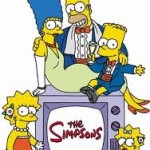
And then there are all the articles, online and otherwise.
I have to say, I find it somewhat disheartening that so many articles about the show start with a cliche about how the show is beloved, but not good anymore or simply postulate the show needs to go off the air.
In truth, the show itself hasn’t changed all that much since its “heyday”; rather, it changed the world of television, bringing us animation for adults, sitcoms without laugh tracks (and thus a faster pacing in the comedy), imperfect lower class families, TV families that actually watched TV, postmodern pastiches that mix high and low comedy, and satire for the masses. It took a while, but then a lot of other shows started imitating the innovations. And then, over the years, new shows with new innovations (like cartoons not just for adults but sick adults like me and my friends) came along.
The Simpsons should certainly not attempt to mimic these shows, to keep pushing the television envelope. It ushered in a revolution; it should not attempt to one-up Archer. (Something will, though. Archer will become quaint. Whatever makes it so will shock us for a while, until something comes out to make it seem old.)
The Simpsons is basically the same. It’s we, the audience, who are different. We expect a lot now–because the show has taught us to. Because the show opened the door for so many other shows to experiment. And we watched those experiments–and we keep expecting more.
And then we get cranky & say The Simpsons is not funny or relevant anymore.
Hey, you don’t have to like it now–you’re a different audience than you were.
But so am I. And I still think it’s funny. True, there are not as many episodes that catch me the way my old favorites do (it should be noted, of course, that not all fans agreed that what we now consider the best episodes were good–“Deep Space Homer,” one of my all-time favorites, was often lambasted by viewers at the time).
However, there are still new episodes that do catch me. “Coming to Homerica” was an instant classic.
There are still jokes that make me laugh way too much (such as Maggie’s “first” word–in Norwegian–and her mother’s reaction to it, in the above episode).
And there are still episodes that move me. “Lisa Simpson, This Isn’t Your Life” features Lisa going to a private school, as she has often wanted. Lisa hurts Marge deeply in this episode, insulting her mother, her mother’s choices, her mother’s intellect, her mother’s choice to be a stay-at-home mom. However, Lisa then finds out that Marge has taken on some demeaning and grueling work to allow her to go to this school. It’s hard to watch that moment.
I care about the series & its characters. One of the things that makes The Simpsons special is that the characters are imperfect, but lovable. The shows’ imitators (with the exception of Bob’s Burgers, which is excellent) have often neglected this part of the equation. You can kill Kenny hundreds of times, and not just because he’s coming back. I’d actually cheer if they killed Peter Griffin; I can’t watch him verbally and mentally abuse his daughter anymore. And Stewie can insult and try to hurt Lois until the end of time. There may be moments of humor, but I won’t feel for Lois, who cannot apparently be emotionally hurt (and is thus unrelatable), nor do I have a reason to understand Stewie’s vendetta.
Lisa’s tension with her mother, and her mother’s ultimately loving response takes me back to what I loved about all those old episodes people apparently long for–the moment when Bart writes “Hero” on his father’s bald head, when Homer tries to win his daughter back after her crush on a teacher exposes a problem in the father-daughter relationship, when Marge takes Homer back, despite his tattered rags being caught on the coffee table. 
The other reason for my annoyance at the naysayers is a selfish one. I have friends who work on the show. I have no doubt that I could continue my teaching and scholarship on the show once it’s off the air (in the same way we still read that damn Shakespeare guy), but I want my friends, who are writing jokes, animating scenes, composing music, and putting everything together to keep doing what they love.
Especially since what they love is something I still love.
(And, c’mon, The Simpsons is still better, even in a not great episode, than 95% of the crap on TV; 40% of all people know that!)
*****
Further thoughts on the APP:
I have to admit that I’m not sure exactly how the APP will work. I still have a dumb phone, so I don’t use APPs. This APP, though, is digital, meant for cable subscribers. On the one hand, that means I can get it, but it might also means that it won’t be as useful for my students as I’d hoped. Right now, when I teach the show, I have to show many of the episodes in class, which takes away from our talking time, since they don’t have access to the episodes streaming anywhere. However, most of my students only watch TV on the computer, meaning they aren’t cable subscribers. We’ll see.
Seeing Peter Sagal
April 13, 2014On Friday, April 11th, Ian and I headed in with a full crowd to see Peter Sagal, host of Wait Wait, Don’t Tell Me. The Mondavi center promised a behind the scenes look at our favorite weekend show, but Sagal gave us a talk about a miniseries he did with PBS instead: Constitution USA. Sagal introduced us to several people, all of whom believe in the Constitution, all of whom have very different ideas about what it’s meant to do for them.
My three take-aways: 1. Sagal is funny in person too. 2. He pointed out that our constitution is the first and shortest, because our founders were smart enough to know it should be brief and vague enough to let us adapt it as we evolved. 3. The Constitution only works because we believe in it. Lots of other countries have one–many of them are repressive regimes. Their constitutions are sick jokes–more like PR for the international community than a document that makes rules and guarantees rights for their peoples. As Sagal said, our constitution is like Tinkerbell, and we gotta keep clapping.
I was disappointed that we didn’t really get to talk about Wait, Wait, disappointe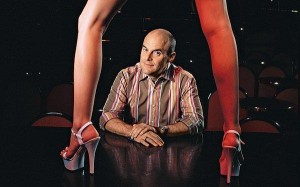 d in Davis for booing when he mentioned that we used to be Berkeley’s farm (we did–why shame him for bringing it up, even if he did find it funny?), disappointed that even with Q&A, we only got an hour and a half. On the other hand, it’s half an hour more than I usually get with him.
d in Davis for booing when he mentioned that we used to be Berkeley’s farm (we did–why shame him for bringing it up, even if he did find it funny?), disappointed that even with Q&A, we only got an hour and a half. On the other hand, it’s half an hour more than I usually get with him.
A Modest Proposal for Young Children at the Movies
December 30, 2013Yesterday, I sat in a dark theatre to see the second Hobbit movie for a second time. The film is PG-13. The child sitting behind me with his father was about half the requisite age.
Now, each parent should get to make his/her own decision about whether a movie is too adult for the child in terms of sex and violence. While I think certain scenes were a bit much for a child that age, the parent knows what might cause his/her child nightmares much better than I do.
However, if you know your child doesn’t have the capability to follow the plot of a movie without your constant oral aid, perhaps this is a movie you could watch at home together.
I took my son to a ton of plays and movies before he was necessarily sophisticated enough for them–this made him a sophisticated audience member. Yet I didn’t allow him to talk through plays or movies. Questions were for after.
If your child can’t follow when we’re in “real” time or flashback, if your child doesn’t understand that most questions can be answered by letting the scene play out (who’s that? they’re about to tell you!), or if the movie is going to use a bunch of words your child doesn’t know (like “forge”), then you have three options, especially if you are incapable of teaching your child to whisper, as the father behind me was.
1. See the movie at home.
2. Have your child ask you questions after the movie.
3. Sit in what I propose to be the “not mentally up to this film” zone. I would like to suggest that the first few rows of films be reserved for young children (and others who aren’t ready for what they’re seeing). It’s not practical to put children and their parents in a separate theatre or have a walled-off space, but those first few rows tend to be fairly empty of other patrons. Also, children don’t get neckaches the way the rest of us do. (As for their parents, they don’t want to start arguing with me about being or having a pain the neck when their kids can’t shut up.)
This would allow those parents who want to see an adult film but not get a babysitter or who want to see an adult film but not alone or those who want to teach their children the magic of a film before the film hits DVD to view the movie (though they should still try to teach the art of the whisper).
This would have made life easier yesterday; I actually started anticipating questions, which was not a fun game even though I was spot on. It would not have solved the problem completely when I sat in front of a child who was MUCH too young for a Harry Potter movie and who started screaming and sobbing when Dobby died, but at least the screamer would have been a few rows farther away.
If that’s sitting too close to the screen for some parents, then might I suggest options 1 or 2?
Goodbye, Mrs. Krabappel
October 28, 2013This week, Marcia Wallace, the voice of Mrs. Krabappel, died, just a few days short of her 71st birthday.
Edna Krabappel will not be replaced. She’ll join Lionel Hutz and other voices who have been silenced in similar ways.
Wallace was a wonderful actress and comedian. I think I first became really aware of her work with Bob Newhart, but of course I will remember her as Edna.
There’s something about our elementary school teachers, the good and the bad. They stay with us, in our dreams, our imaginations. They spend more waking time with us than our parents often do at that age. They are experts in all subjects (or at least seem so). They are more patient than I will ever be. They read whole books to us, chapter by chapter, day by day. They figure us out, push us towards new things (at least the good ones do.)
My favorite things about Edna:
1. Her willingness to believe in the love of a certain Woodrow, who couldn’t tell her why he couldn’t be with her, where he was going, or even how he was going to get there.
2. The fact that she has bad days sometimes and she doesn’t beat herself up about it.
3. The fact that she is, in fact, an excellent teacher, as evidenced by her Teacher of the Year award.
4. When Principal Skinner abuses her heart, not only does she refuse to take him back, but she also is wise enough to reject her rebound guy just in the nick of time.
5. On occasion, she has stood up to the administration.
6. After she marries Ned, she also asserts her right to co-parent (and perhaps will help the boys turn out a little less sheltered and helpless).
7. When Ned almost didn’t marry her, because of her “promiscuous” past, it was upsetting. Equally upsetting, though, was when he decided to “forgive” her for having had a sex life before him. Luckily, Edna refuses to accept this and demands that accept her –and love her– for who she is.
8. Through everything–getting her fired, faking serious illnesses, replacing her birth control with tic tacs–Edna has only hit Bart once.
9. Yet he’s kissed her once, when she acknowledged his applied learning.
10. Edna will be remembered for her laugh and, most of all, the way in which her relationship with Bart so defined them both.
The end of Futurama??? Bite my shiny metal ass!
September 3, 2013Tomorrow marks the second ending of Futurama. I’m going to miss it. 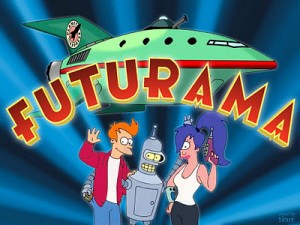
The show originally aired on Fox from 1999-2003. It was revived by Comedy Central in 2008. While the original Fox shows were good (with perhaps the exceptions of the film-length works), the Comedy Central version has been really good, producing some wonderful episodes with biting satire.
Futurama is the brainchild of Matt Groening, creator of The Simpsons. When The Simpsons aired, Groening’s team had creative control (i.e. the show didn’t receive ‘notes’). Groening fought hard to maintain that policy with Futurama. Those of us who love the show are grateful–Fox would have taken out a lot of the darker elements that make the show what it is.
The title comes from an exhibit at the 1939 World’s Fair that imagined what the world would look like in 1959. Futurama shows us the years right after the start of the fourth millennium–the year 3000. It’s the show’s inherent science fiction that both turns off some anti sci-fi people and attracts the rest of us. It also allows the writers to play with reality for the sake of humor and social commentary. When else but in the year 3000 could Richard Nixon’s head be president? Could an evil “mom” figure rule the world through the eyePhone? Could a robot steward remind his airline passengers, “In the event of a wormhole causing us to travel back in time, do not kill your parents. If you are traveling with a small child, help them to not kill you before you don’t kill your parents.”
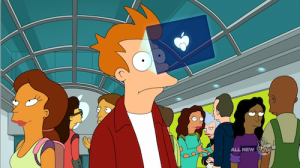
Well, you could maybe have those things in a Simpsons Halloween episode, but the whole joy of Futurama is that you can have the horror and comedy of sci-fi without having to wait for October (or, when stupid sports are ruining my life, November).
I still prefer The Simpsons to Futurama. And while Futurama is critically acclaimed, it seems the fans continue to support the family comedy that changed television over its sci-fi little brother. However, I don’t claim that The Simpsons is superior in writing, satire, or animation. Or that family comedies are inherently better than workplace comedies. Rather, my loyalty to The Simpsons is partially caused by it coming into my life when I was so young. 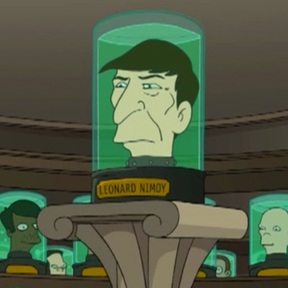
Also, I have never really liked Fry. And it’s hard to really, really love a show when you don’t love its main character. Although Bart and Homer both have problematic personalities, deep down, I like them. However, Fry could go back into a freeze pod, and I wouldn’t miss him. I would miss lots of the other characters–Leela, Kif, Zap (whom I wish we could have heard voiced by Phil Hartman, as was intended [miss you, Phil]), Morbo, and the Robot Devil, a diabolically good singer, etc.
Now they’re all leaving. Luckily, Netflix is streaming them, so you can binge watch, as I’ve been doing this week. Find yourself in future when suicide booths are luckily not well constructed, when Christmas has finally become X-Mas, when those who have difficulty with lessons in love can have a very sexy learning disability (sexlexia), when we finally discover why cats are so adorable,* when Al Gore can explain the true role of the V.P.:
Fry: “Who are you people?”
Al Gore: “I’m Al Gore. And these are my vice presidential action rangers, a group of top-nerds whose sole duty is to prevent disruptions in the space-time continuum.”
Fry: “I thought your sole duty was to cast the tie-breaking vote in the Senate.”
Al Gore: “That, and protect the space-time continuum. Read the Constitution!”
Futurama will remain one of the few shows to come back after a cancellation (the other two notable shows are Family Guy and Arrested Development). It’s fitting, really, that this show (in which the main character didn’t quite succeed in his world and gets another chance in the future) came back from the dead to succeed again. As we say goodbye tomorrow, we’ll cross our fingers that the space-time continuum will allow another rebirth. Until then, let’s eat that pizza the I.C. Wiener ordered.
I would so watch the evening news if Morbo were the anchor!* The cats are adorable because they have an ulterior motive. Josh Weinstein, who wrote this episode, is also adorable, but it’s hard to believe he has an ulterior motive (which is probably exactly what he wants me to think). 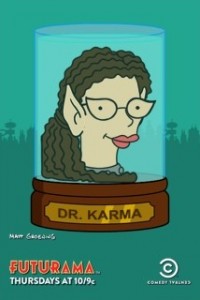
True Blood and PTSD
August 15, 2013[Warning: Spoilers follow. If you’ve not seen the August 2013 episodes of True Blood, you don’t want to read this.]
I’m grateful The Daily Show for its coverage of and attention to the ridiculous treatment of our returning veterans as they attempt to apply for benefits. When we think of these benefits, we usually think about medical coverage for physical injuries from combat. We think less about mental injuries from combat.
The term PTSD (or, as it will be called here, in honor of George Carlin, “shell shock”) has moved into our vernacular, and some tv shows featuring characters in the military (or other dangerous services) do address it. SVU had an episode recently called “PTSD”; characters on BSG, M.A.S.H., Breaking Bad, Downton Abbey, etc. have exhibited symptoms of the disorder.
There are some films (fiction and documentary) that address the issue as well.
However, most depictions of shell shock in the media do not address a common outcome–suicide.
2012 was a record year for military suicides. We lost more soldiers to PTSD than to combat. In fact, we’re losing them at a rate of one about every 18 hours.
The fact that we’re not talking about this made this week’s True Blood, featuring the funeral of one of the most beloved characters–and some of the revelations of his shell shock leading up to it–stand out.
I watch True Blood with a group of friends. We eat, drink, and laugh. In fact, we’ve started taking a drink each time a character says something that could only be said on this show (like “Who the fuck is Mary Poppins, and can I please kill her?”). It’s our Vampire Porn Soap Opera.
But this last episode, “Life Matters,” lingered on Terry’s life and his death in a poignant way. Characters die on this show all the time. So many, however, that we rarely get to morn them. And we haven’t had a beloved character die in a while. This mourning, though, wasn’t just because we’ll miss Terry. It was because we needed to grapple with what killed him.
It wasn’t a serial killer. It wasn’t a supernatural force–a were-whatever or a vampire or a vampire virus.
Terry chose to die. And he chose to do so because he couldn’t live with what the war had done to him and with the things he’d done.
And we’ll miss him.
When True Blood came out (and before that, when the book series came out, which I’ve read (and reviewed here), it was interesting because of its vampire characters’ analogy to the gay rights movement. It hasn’t really done anything moving or intriguing in a while.
Until now.
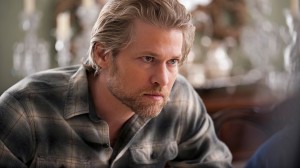
P.S. The book series recently came to its conclusion.
Here’s an update to my earlier post. One anonymous commentator on my post mentioned that she agreed with some of what I said. The books that have come out since my post have not repeated the problems I listed. Coincidence? Or did I unintentionally manage to give Harris some writing feedback? (I mean, I don’t get anonymous commentators. You all know me, which is why you read this. Unless you’re searching for reviews of your own work, which a few people who don’t know me have done on this site.)
Sookie makes her peace with her vampire lovers and ends up with the man she should have ended up with the whole time. Loose ends are wrapped up. The danger seems to have passed. A good end to a good series.
Recent Plays
August 12, 2013Okay, recent maybe isn’t the best word. But I’ve seen some good stuff over the past few months.
A.C.T. (The American Conservatory Theater) imported The National Theatre of Scotland (whom I got to see at Mondavi earlier this year) to perform Black Watch. The Black Watch is a famous Scottish regiment (formed in 1725, first comprised of Highlanders). This play not only gives us a bit of their illustrious history, but also details their controversial tour in Iraq as part of Bush’s coalition. The play was heartbreaking and beautiful and possibly the best thing I’ve seen at A.C.T.
Two weeks ago, I saw a very abbreviated Hamlet at the Francis Ford Coppola winery. Justin Ashforth adapted, directed, and starred. And I think that was a problem. It’s a bad idea to be that close to a production, to not have the distance to see when other actors are messing up (by simply being flat, as one was) or when you’ve cut too much/not enough (e.g. why have other characters talking about Hamlet going mad when you cut out Hamlet acting mad?).
I’ve been able to see two shows by Common House productions this summer. Common House is a relatively new company in Davis. Their repertory shows this summer (out on the Wyatt Deck) were The Importance of Being Earnest and Love’s Labour’s Lost. Earnest has long been one of my favorite plays (I even taught it once, years ago). LLL isn’t one of the great ones (in terms of Shakespeare’s other works), but this production brought out the what comedy and cleverness there is in the text.
When I was in Chicago in May, Denise and I hit the Chicago Shakespeare scene, which featured an AMAZING adaptation of Othello. Othello‘s always hard to watch, but this show was a joy. Othello: The Remix is a modern adaptation of the show, done by only four actors and a D.J. The show is completely sung in hip-hop style and is about hip-hop artists (Desdemona, whom we never see, is a diva). A few of the audience members took a while to warm up to the concept, but Du and I had our hands up in the air from the very first (and got a smile from one of the writer/performers).
Not only was the show wonderfully sad and funny and old and new (complete with geek references from both renaissance and 21st century pop culture), but it was actually really close to how a Shakespeare play would have been to its audience–men playing all the roles, minimal props and sets, a focus on the sounds (audiences are called audiences because they went to “hear” a play).
Also, it was fun because one of the actors, Jackson Doran, looks a lot like our friend Ben, so we kept imagining him doing all the numbers.
In London, I got to see a few shows:
Children of the Sun at the National. I didn’t know anything about this show going in, but I’ve never seen anything bad at the National. Andrew Upton revised Gorky’s play. It’s still very . . . Russian. There’s a lot of tea, of depression, of thwarted love, of class boundaries and barriers, of servants with their ears (and hands) at the door. It ends with the rich destroyed due to what one of them did. It ends, literally, with fire. I was in the front row and I could feel the heat. (And it was surprising–London is very paranoid about fire, especially in theatres).
One Man, Two Guvnors is also an adaptation. The Commedia dell’arte play, A Servant of Two Masters, has been updated by Richard Bean. It was everything it was supposed to be–funny and farcical, with a little bit of audience participation thrown in. My one complaint is that the end of the first half is so good, that the rest of the show is anticlimactic.
The Taming of the Shrew at The Globe. Taming is another problematic play. This was my fourth time seeing it. Long ago, in Tallahassee, and a couple of years ago, at Cal Shakes, I saw “modern” adaptations in which Petruchio rode motorcycles. My favorite rendition was in Regent’s Park in London 2006. The actor playing Petruchio was older than we expected, but he was amazingly charismatic and genuinely seemed to be taken with his Kate. I saw that with my friend John Boe. Seven years later, we sat down for this all-female production. The women did a great job (especially since there were only eight of them). However, the end was a downer. Petruchio does indeed break (tame) Kate. And she remains broken. His face falls when he realizes this won’t make for a happy or lustful union. It’s probably more realistic than other versions, but I want my smart Petruchio–the one who loves her all along–despite herself–back.
The little death on Game of Thrones
May 19, 2013No–no real spoilers here. I’m not going to talk about which of your favorite (or not favorite) characters are going to die on the hit HBO show.
I’m gonna talk about orgasms.
Ever since GOT premiered, the internet has been debated the sexual politics of the show, with some people thinking it’s sexist and others finding some of the strongest women on tv there. Saturday Night Live even did a fantastic sketch about why the show features so much nudity (http://www.brobible.com/entertainment/article/snl-game-of-thrones).
And there is a lot. Exposition tends to happen in whorehouses, as women of the night work on their technique. What’s interesting about most of those scenes, though, is the attention to artifice. These scenes do not feature women with their clients. Instead, the women train each other to fake pleasure, turning on and off the moaning at will.
However, what pleases me more and more about the show is the focus on actual female pleasure.
One of the most frustrating things about our pornographic society is the focus on moaning and other signs of pleasure, but the lack of female orgasms in our sex scenes. The women moan enough to let you know you’re doing a good job, but not enough to signal that they’re actually getting off.
Thus, not only is Game of Thrones breaking ground with its strong female characters, it’s actively discussing female pleasure. We don’t see the orgasms, but an amazing amount of time is given to discussing them, especially considering how many plotlines have to be crammed into each episode.
The Queen of Dragons has a happy marriage once she learns to have good sex with her husband. Margaery tries to tell Sansa that her fiance may be able to satisfy her sexually, even though he isn’t what she wants in a husband in other ways. When young Podrick spends some time in the whorehouse (his first time knowing women), he isn’t charged because the women enjoy it. Every man in King’s Landing speculates about what he’s done to make women happy–not with jealousy–but with a desire to copy his actions. Jon Snow is protected by his wildling lover because of whatever it is he can do with tongue, proving that he doesn’t need the advice a wildling general tries to give him about how to please a woman.
Game of Thrones is a guilty pleasure, but at least it’s training its viewers about what pleasure should be.
WonderCon 2013
April 9, 2013As WonderCon 2013 is the only big Con I’m likely to attend this year, this is likely the only Con blog you’re all going to get for a while–enjoy!
For the first time in 13 years, the boy and I had the same Spring Break, which happened to fall during WonderCon, so the boy accompanied me down to Anaheim.
I have to say, after a couple of years of doing these things, the most exciting reason to go is to see my friends and super-geek acquaintances.
Thus, shorty after we arrived, we went to see Barry, one of my favorite bartenders in all the world. After a ridiculously expensive dinner (just assume that every meal I mention is ridiculously expensive–bottles of water at the Convention Center are $3), we headed to bed so we could get a good night’s sleep. I think we slept for 11 hours–we both needed it. 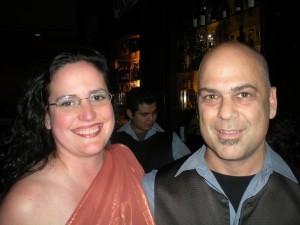
And then it’s mostly a blur.
One day I was Zuul, the next I was Gaiman’s Death, and I ended up in my TARDIS dress for the last little morning. We saw some amazing costumes–including one little girl dressed as Death (her very lanky father was Dream), lots of Doctors, tons of Star Wars characters, a great spider, etc. etc. etc.
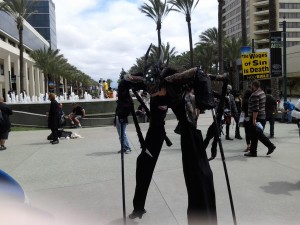
And I’m going to apologize now for not having many pictures. Neither the boy nor I are particularly bright about having the camera out and ready to go. (Selfishly, I would have wanted more pics of my costume, but getting the boy to take a picture of me is difficult for some reason.) However, the other reason for few pictures is how annoyed I get by the way traffic stops about every 10 seconds on the floor because of people taking pictures. No exaggeration. People ask someone in costume for a pic (a pic with the woman if the costume leaves little to the imagination–just a pic if it’s not a particularly revealing costume), the person always agrees, and then there’s the camera fiddling, the backing up to take up the entire aisle so you can get every inch of the person in the pic, etc.

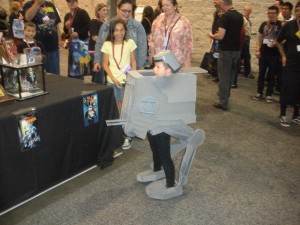
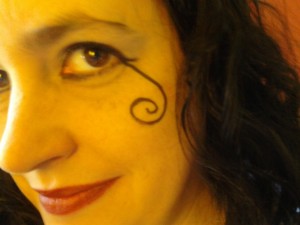
I got to see my old friends–cartoonist/writer Lonnie Millsap, cartoonist/writer/co-founder of ComicCon Scott Shaw, Anthony Del Col, one of the authors of Kill Shakespeare, all the guys who work at Bongo Comics, etc.
And I got to sit in on some amazing panels, including both of Scott’s (one is his “Oddball Comics” routine; the other is the improv cartooning panel). There was also a writing panel with Jane Espenson (writer of Buffy etc), Amber Benson (Tara on Buffy), Patrick Rothfuss, Frank Feddor, and Ashley Edward Miller. Best piece of advice for writing science-fiction or fantasy? Set up your whole world–know it at an atlas/encyclopedia level–but show the audience about 10% of that. They don’t want to read an atlas or an encyclopedia.
Amber Benson also confided that she was so glad she’d gotten into writing/producing, so she didn’t have to spend her days down on the exhibit floor signing autographs.
I got to meet Jane Espenson on the last day, which was amazing. I basically fawned all over her. There was a little less fawning, but no less excitement when I got to meet Terry Moore and a very nice Canadian who’s going to be making an educational video-game to go with Kill Shakespeare. He’s moving to America (SoCal) soon, so he may come up when I teach Kill Shakespeare in my graphic novel class.
The coolest I played it was when I found myself sitting at the same communal table at the bar on the last night with several people from Dark Horse Comics. One of the guys had just hosted the Buffy comics panel. When it was finally revealed through conversation that I was a fan and had been to the panel, I had to admit that the only reason I hadn’t squealed already was that I was trying not to be a big ole fangirl.
My own panel went well. When “regular” geeks (as opposed to academic geeks/professional geeks) wander into the academic panels, they have a tendency to wander out again. However, none of the 40 or so people in the room while I was talking left, which means a lot there. (People will even leave a room when Joss Whedon is in it, which I can never quite understand–maybe they’re so excited that they’re shitting themselves?)
Speaking of Joss Whedon, I got to be in the giant arena room when they had the panel with Joss and several of the actors, and the cinematographer for Much Ado About Nothing. The movie looks fantastic–the props are modern (there are cell phones), but the dress/style of the piece is an old-fashioned screwball comedy, including the film being in black and white. Can’t wait.
I got a shout out from the Bongo Comics panel–during the Q&A, they introduced me to the rest of the audience and mentioned my book. And that was awesome!
But one of our very favorite things was a quiet dinner with Lonnie and Scott. Scott is a survivor of a different time, when there weren’t really girl geeks, when ComicCon was in a basement and mothers escorted their sons there to make sure they weren’t getting diddled by the counter-culture artists. And he’s one of the sweetest, funniest, most remarkable men I know. He spends an awful lot of time at conventions looking at the work of child cartoonists–he remembers them from year to year and encourages them to keep drawing, before drawing them something original to take home. Lonnie is a friend I know through Denise. (She can totally pick ’em!) Watching him get better and more famous every year is a great honor. 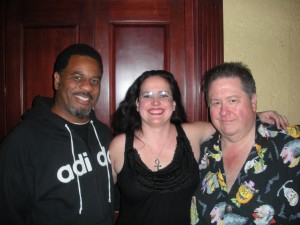
I left a little early so I could prep for my brand new Spring quarter–only to get home to a dark house. The power was out; my prepping plans were thwarted, but there was wine and Vanessa and Kevin and candles, and so we made it through.

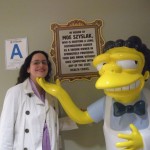
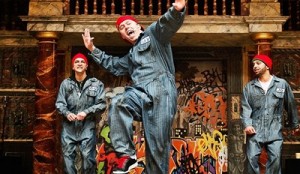
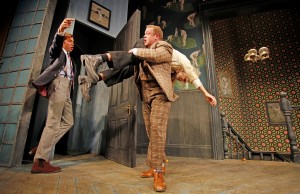
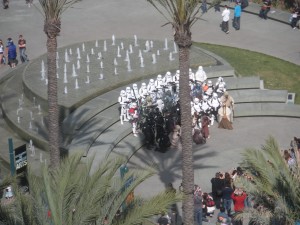



Recent Comments